Despite good sales overall, the mood in the mushroom sector remains quite tense. "In terms of sales, we started the new year well. In the summer months, there was the usual 'sales slump', although this was somewhat more prominent than in previous years. Since around mid-August, the sales have picked up again significantly. In contrast, however, the general availability of goods is currently very tight in Germany and throughout Europe. This in turn is because many producers are experiencing weaker yields than usual as a result of a wide variety of factors and influences," Matthias Surmann (pictured below) explained, Managing Director of the OMpilze cultivation company based in Goldenstedt, Lower Saxony, following a tour of the company as part of this year's BDC conference.
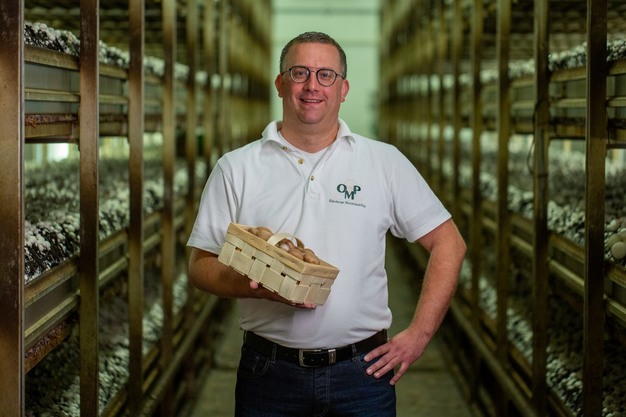
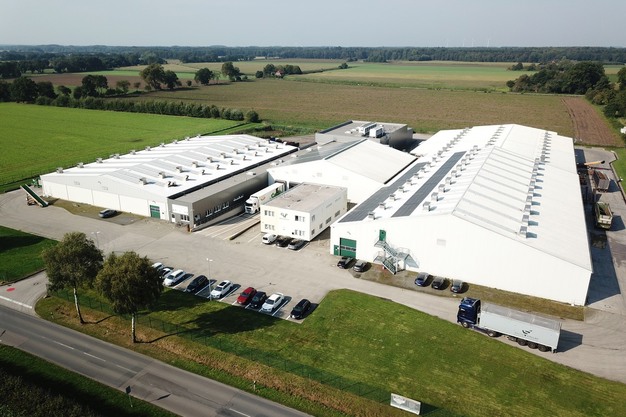
Aerial view of the modern location in the Oldenburger Münsterland. One third of the entire operation (on the left in the picture) was converted to organic production in 2022.
Difficult start for the organic division
OMpilze GmbH & Co KG was founded in 2010 by four long-standing ELO members. Initially, the company consisted of a total of ten cultivation rooms as well as a packaging hall and offices. In 2012 and 2014, the site was expanded by a further five breeding rooms. In 2016, the - until now - largest new extension was built, adding ten breeding cells, a new packaging hall and a combined heat and power plant. Since the founding of the organic division, Goldenstedter Bio-Pilze GmbH & Co KG, only organic mushrooms have been cultivated in the newest construction.
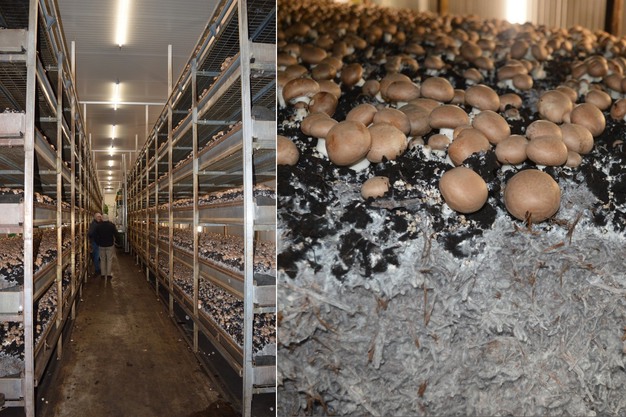
An insight into the organic mushroom cultivation. The farm has a total of ten breeding cells for their organic production.
"But 2022 in particular was a major challenge for us and the entire industry," says Surmann, looking back. The sharp rise in the minimum wage in October 2022 had an impact on the entire wage structure on the farms. "Above all, however, the unexpectedly drastic rise in costs following the energy crisis and the war in Ukraine meant that many companies in the sector had to deal with a drop in turnover. In my opinion, the resulting uncertainty among the population led to a reluctance to buy, primarily regarding brown mushrooms and especially for organic mushrooms. As a result, we actually had a comparatively difficult start with organic mushrooms that year. Since then, however, sales of fresh mushrooms have generally developed very positively. Mushrooms are right on trend, they are a very healthy, sustainable product and are ideal for a vegan or vegetarian diet. Of course, they also taste wonderful as a side dish with meat-based dishes."
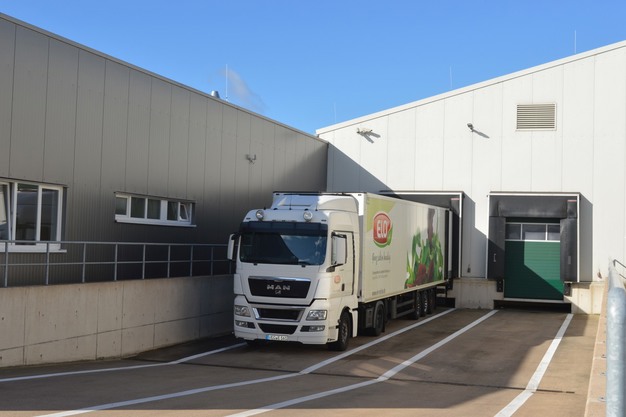
Lorries from the nearby exclusive marketer ELO eG dock at the modern company site in Goldenstedt, Lower Saxony.
Mushroom prices have tended to rise in recent years, but the price increases have not offset the cost increases over the same period. Surmann: "As a breeding company, we are faced with the task of adapting our production processes so that we can continue to operate profitably. In practice, this means that we try to optimise and/or automate operational processes wherever possible, which in turn is only possible to a limited extent and is inevitably associated with very high investments."
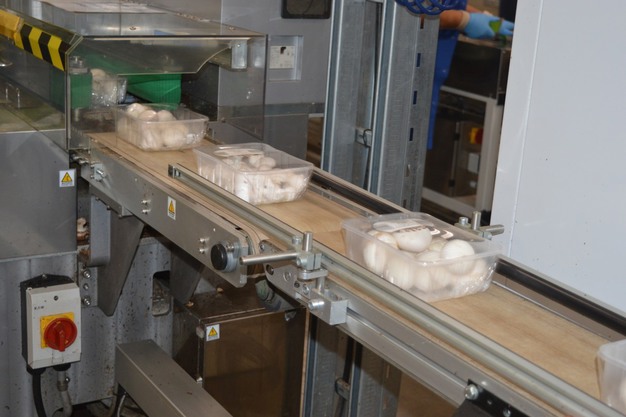
Both the organic and conventional cultivated mushrooms are packaged in cardboard or plastic trays immediately after harvesting, in line with market requirements and customer wishes.
Multiple challenges jeopardise mushroom cultivation
Short and long term, the mushroom industry is facing many major industry-specific challenges that will also lead to further cost increases, says Surmann, referring to the core topics of this year's BDC conference. "In particular, the availability of the raw materials we need to grow fresh mushrooms. In many regions, the grain harvest was very poor this year, which will ultimately lead to a shortage of straw. The availability of horse and chicken manure is also becoming increasingly difficult, as these materials have now also become interesting for other, non-agricultural uses. When it comes to topsoil, we are faced with the problem that peat-based soils are to be replaced in commercial horticulture by 2030, which will directly affect us as a breeding company. This peat is only applied to the substrate as a thin covering layer; without this covering soil, fruiting body formation is not possible. As an industry, we have been looking for substitutes for many years, but so far, we have not found a viable alternative in terms of quantity or quality. We simply need more time."
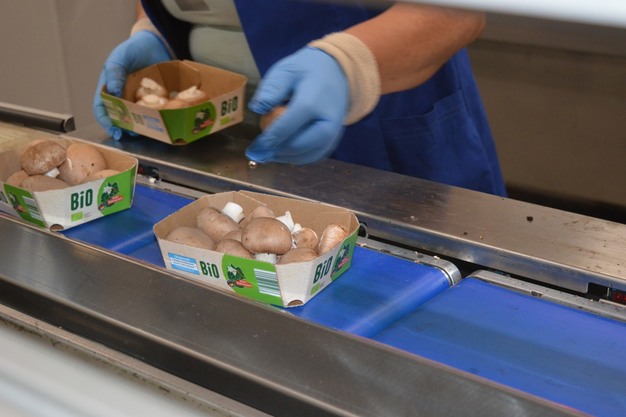
Freshly harvested, brown organic mushrooms for the domestic retail sector.
In addition, the constantly changing regulatory challenges and political framework conditions make it difficult to survive and compete. "The best example is the implementation of the planned new packaging regulation (PPWR-VO), which I personally consider to be very difficult or even impossible in practice for a sensitive product like mushrooms. However, we are constantly in close dialogue with the packaging suppliers and associations in this regard. Furthermore, the increased wage rises and the general shortage of harvest workers continue to be a major issue. Our team is highly motivated and committed to working proactively on the political challenges we face. We are working together to secure and further improve the level of self-sufficiency in Germany. It is important to us not only to react to changes, but also to actively develop solutions that benefit both us and the industry," Surmann concludes.
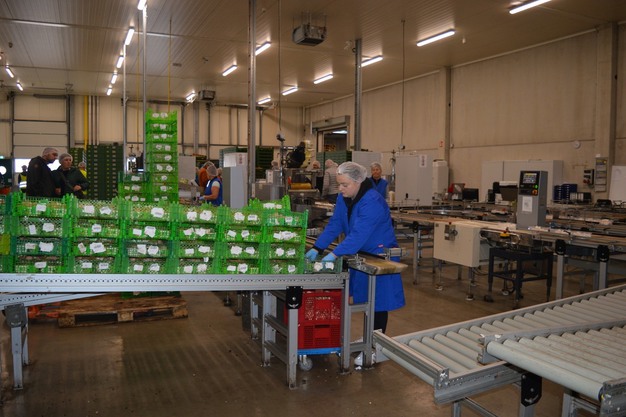
Insight into the modern sorting and packaging hall, the centrepiece of the company.
For more information:
Matthias Surmann
OMpilze GmbH & Co. KG / Goldenstedter Bio-Pilze GmbH & Co.KG
Bruchweidenstraße 25
49424 Goldenstedt
Phone: +49 (0)4444 967278-0
E-Mail: [email protected]
https://www.elo-food.de/
